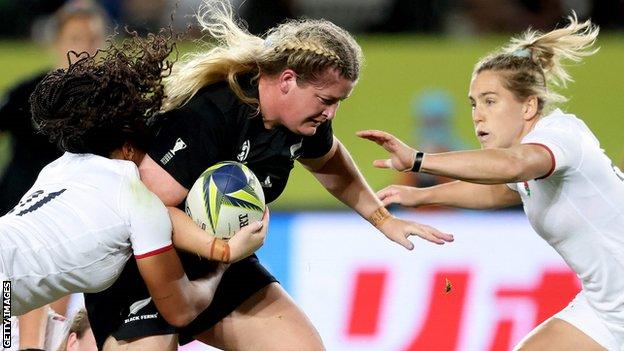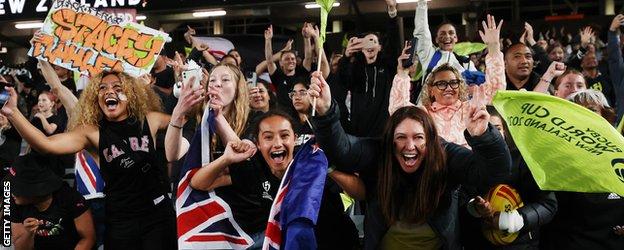[ad_1]

England captain Sarah Hunter said the latest Rugby World Cup made her feel like “finally people are just waking up to how great our sport is”.
Rugby Football Union chief executive Bill Sweeney agreed, saying the nail-biting final was “probably more entertaining than the men’s game”.
The tournament in New Zealand was the best-attended women’s World Cup ever, breaking the attendance record for a women’s matchday twice – the opening-day attendance of 34,235 surpassed by the 42,579 sell-out Eden Park crowd for the final.
A turning point for women’s rugby, but there is more to come.
Here, BBC Sport explores some of the main questions concerning the future of the game and England’s team after their fifth World Cup final loss to New Zealand.
Will the England team change after World Cup defeat?
None of the Red Roses have announced their retirement since the final, but 37-year-old Hunter has already confirmed she will stop playing before a home World Cup in 2025.
Abbie Ward – a key player in England’s formidable line-out – says she will “100%” continue until the next World Cup, while star centre Emily Scarratt, who is 32, is undecided.
She said losing a second successive final to New Zealand was “certainly a driving force to win a World Cup”.
Scarratt said: “I said to my mum when I saw her and gave her a big hug: ‘Brace yourself, we might have to do another three years of this.’
“It’s definitely not a decision to be made now. We’ll see.”
Head coach Simon Middleton has also lost two World Cup finals in a row, and he is yet to confirm whether he wants to stay at the helm.
Middleton, whose reign has included a record 30-Test winning streak and four successive Six Nations titles, has a contract until the end of the 2023 Women’s Six Nations.
Sweeney told BBC Radio 5 Live it was “important to have some continuity” after the World Cup, adding it “would be good to have a woman” leading England “at some point”.
He said there was “a raft of coaches” on the RFU’s radar to succeed Middleton and confirmed he would discuss the head coach’s future when he is back in England.
Will England’s loss affect investment?
The RFU has led the way in investing in women’s rugby since giving the Red Roses full-time contracts in 2019.
Other sides, including Wales and New Zealand, are now following suit in making their women’s teams professional.
The Black Ferns were only given contracts earlier this year, and Sweeney said it was “a bit disappointing” they won the World Cup despite a comparative lack of investment.
With the game still growing, both the Red Roses and the World Cup in New Zealand were run at a loss.
But Sweeney said England’s final loss “won’t change the views on investment”, adding 70% of the fans at Eden Park on Saturday were new followers for New Zealand Rugby and women’s rugby “is good for the overall health of the game”.
World Rugby chief executive Alan Gilpin said the success of the tournament in New Zealand had “given us confidence to invest more”.

When can you next see England in action?
In two weeks, England’s players can return to play for their clubs in the Premier 15s – the most competitive women’s domestic league in the world, which is also benefiting from increased RFU investment.
Their next international outing will be in the 2023 Women’s Six Nations, which starts on 26 March 2023.
In that tournament, England will tour the country as they play in Newcastle and Northampton before a first standalone fixture at Twickenham against France in what is likely to be the decider.
About 20,000 tickets have been sold for the Twickenham game, and Sweeney is confident that number will reach 40,000 – half the stadium’s capacity.
The RFU is also hopeful it can host World Rugby’s new women’s competition WXV in 2024, in preparation for a home World Cup in 2025.
Sweeney is aiming for the 2025 World Cup to break even and says “we will fill Twickenham” for the final “and hopefully for the semi-final as well”.
Before that, the plan is to host matches in different regions around the country in what Sweeney says will be “the best ever women’s World Cup”.


By Becky Grey
Source link




